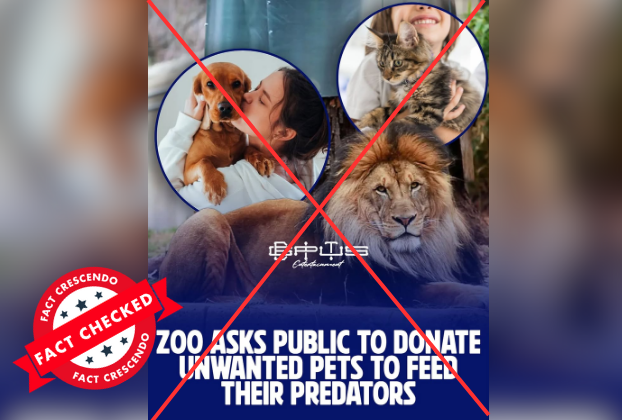Social media has erupted with claims that Aalborg Zoo in Denmark is asking the public to donate unwanted pets to feed lions, tigers, and other predatory animals. The phrasing of these posts has triggered emotional reactions worldwide, raising ethical concerns about the fate of domesticated animals at the hands of zoo carnivores. However, while the zoo does accept animal donations as food for predatory animals, they do not accept household pets like dogs and cats.
Social Media Posts
Social media users have widely shared claims that Aalborg Zoo is asking for animal donations. Some posts even included pictures of dogs or cats, which sparked debate across platforms.
Here is another post with the same narrative.
Fact Check
We began our investigation by checking Aalborg Zoo’s official website. While the zoo has indeed launched an initiative to accept certain animal donations to feed its predators, it does not refer to these animals as “unwanted pets.” According to the zoo’s official statement, the animals accepted include chickens, rabbits, guinea pigs, and horses, typically animals that are no longer needed, are approaching the end of their lives, or require euthanasia for welfare reasons. The zoo emphasises that these animals are not simply castoffs, but part of a system designed to ensure humane treatment and ethical resource management.
Unlike what many viral posts claim, the zoo clearly states that they do not accept cats and dogs as donations. The animals they accept must meet specific health requirements. For example, horses cannot have received medical treatment in the last 30 days. All animals accepted under the program must meet specific health requirements and are humanely euthanised by trained professionals before being processed as food, a critical detail often missing from viral posts.
This program aims to create a more natural feeding experience for zoo animals. Predators like lions and lynx get both physical and mental benefits from eating whole animals, including the fur and bones.
Aalborg Zoo, along with other European zoos, finds that this feeding method encourages animals to use their natural hunting instincts and keeps them mentally active. It’s also considered more sustainable and ethical than only using processed meat, especially since these donated animals would have been humanely euthanised anyway. Rather than seeing it as exploitative, the zoo views this program as a responsible way to use available resources while improving animal welfare for both the predators and the donated animals.
This feeding practice has been implemented at Aalborg Zoo and other Danish zoos for several years. The practice follows established guidelines in European wildlife management. The program is based on principles of animal welfare and resource management. Perspectives on this practice vary across cultures; what seems practical in Denmark may be viewed differently in other countries.
(Source: DR Denmark, Independent)
Language Gap and Mistranslation: From “Husdyr” to “Pets”
A key source of controversy stems from how Danish terms were translated into English. In its official announcements and on its website, Aalborg Zoo used the Danish word “husdyr”, which typically refers to farm or domestic animals raised for agricultural purposes, such as rabbits, chickens, and horses.
However, several English-language news outlets and social media posts translated “husdyr” as “pets”, a word that in English often implies emotional companion animals like cats and dogs.
This shift in wording led many readers to assume that the zoo was asking for people’s household pets, sparking widespread outrage. In reality, the zoo never used the Danish word “kæledyr” (which means explicitly emotional pets or companion animals) or referred to cats and dogs in any capacity. This difference in word meaning helps explain why the zoo’s original message was misunderstood when translated into English.
Conclusion
While the core of the claim is not entirely false, it omits significant context. The claim that Aalborg Zoo is asking the public to donate unwanted pets to feed predators is rooted in a real program, but it misrepresents the scope and intention of the zoo’s actions. The zoo does accept animal donations, but only specific types, namely rabbits, guinea pigs, chickens, and horses, not cats, dogs, or traditional companion pets. All animals are euthanised humanely before being used as food, and the goal is to support the natural behaviour and well-being of carnivorous animals. Misleading translations and viral oversimplifications have obscured the program’s real intent: to promote animal welfare through naturalistic and sustainable feeding practices.

Title:Danish Zoo Accepts Animal Donations for Predators, But Not Household Pets
Fact Check By: Cielito WangResult:Missing Context






